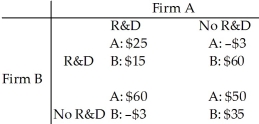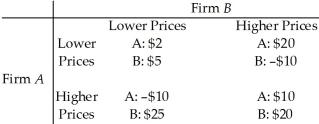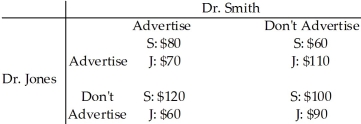A) works only if student 2 works.
B) works regardless of the decision made by student 2.
C) does not work if student 2 works.
D) does not work regardless of what student 2 decides.
E) works only if student 2 does not work.
Correct Answer

verified
Correct Answer
verified
Multiple Choice
Canada's anti-combine law dates from the
A) 1880s.
B) 1910s.
C) 1930s.
D) 1960s.
E) 1980s.
Correct Answer

verified
Correct Answer
verified
Multiple Choice
It is difficult to maintain a cartel for a long period of time.Which one of the following is the most important reason?
A) Each firm has an incentive to collude.
B) Other firms will enter the industry.
C) Firms in the cartel will want to raise the price.
D) Consumers will eventually decide not to buy the cartel's output.
E) Each firm has an incentive to cheat.
Correct Answer

verified
Correct Answer
verified
Multiple Choice
Sarah's Soothing Diapers, Inc.and Orville's Odorless Diapers, Inc.are duopolists, who have agreed to collude.Orville has decided that he will comply with the collusive agreement as long as Sarah cooperated in the previous period.But if Sarah cheated in the previous period, Orville will punish Sarah by cheating in the current period.Orville's strategy is referred to as a
A) Nash strategy.
B) tit-for-tat strategy.
C) trigger strategy.
D) monkey-see, monkey-do strategy.
E) dominant firm strategy.
Correct Answer

verified
Correct Answer
verified
Multiple Choice
Oligopoly is similar to
A) perfect competition because both market types produce identical goods.
B) perfect competition because both firms in both market types make zero economic profit in the long run.
C) monopoly because both market types have barriers to entry.
D) monopoly because both market types have a single firm.
E) monopolistic competition because firms in both markets face a perfectly elastic demand.
Correct Answer

verified
Correct Answer
verified
Multiple Choice
Consider a cartel consisting of several firms that is maximizing economic profit.If one firm cheats on the cartel agreement by cutting its price and increasing its output, the best response of the other firms is to
A) cancel the cheating firm's membership in the cartel.
B) continue to sell at the agreed-upon price.
C) raise their price to recapture lost profit.
D) cut their prices also.
E) cut output to keep total cartel output at its original level.
Correct Answer

verified
Correct Answer
verified
Multiple Choice
Table 15.2.6
 -Refer to Table 15.2.6.Firms A and B can conduct research and development (R&D) or not conduct it.R&D is costly but can increase the quality of the product and increase sales.The payoff matrix is the economic profits of the two firms and is given above, where the numbers are millions of dollars.The Nash equilibrium
-Refer to Table 15.2.6.Firms A and B can conduct research and development (R&D) or not conduct it.R&D is costly but can increase the quality of the product and increase sales.The payoff matrix is the economic profits of the two firms and is given above, where the numbers are millions of dollars.The Nash equilibrium
A) occurs when both A and B conduct R&D.
B) occurs when only A conducts R&D.
C) occurs when only B conducts R&D.
D) occurs when neither A nor B conduct R&D.
E) does not occur
Correct Answer

verified
Correct Answer
verified
Multiple Choice
A tit-for-tat strategy can be used
A) in a single-play game or a repeated game.
B) in a single-play game but not a repeated game.
C) in a repeated game but not a single-play game.
D) in neither a repeated game nor a single-play game.
E) only when there is no Nash equilibrium.
Correct Answer

verified
Correct Answer
verified
Multiple Choice
Use the information below to answer the following questions. Fact 15.2.1 Two firms, FastNet and SmartCast are the only Internet providers in a city. They have identical costs and one firm's service is a perfect substitute for the other firm's service. The industry is a natural duopoly. FastNet and SmartCast decide to collude and agree to share the market equally. -Refer to Fact 15.2.1.What is the Nash equilibrium?
A) Both firms cheat on the agreement.
B) One firm cheats and one firm complies.
C) Both firms comply with the agreement.
D) New firms enter the market.
E) Both firms charge the price that would exist in a perfectly competitive market.
Correct Answer

verified
Correct Answer
verified
Multiple Choice
Use the table below to answer the following questions.
Table 15.2.2
 -Table 15.2.2 gives the payoff matrix in terms of economic profit for firms A and B when there are two strategies facing each firm: (1) charge a low price, or (2) charge a high price.The equilibrium in this game (played once) will be a dominant strategy equilibrium because
-Table 15.2.2 gives the payoff matrix in terms of economic profit for firms A and B when there are two strategies facing each firm: (1) charge a low price, or (2) charge a high price.The equilibrium in this game (played once) will be a dominant strategy equilibrium because
A) firm B will reduce profit by more than A if both charge a lower price.
B) firm B is the dominant firm.
C) the best strategy for each firm does not depend on the strategy chosen by the other firm.
D) there is no credible threat by either firm to "punish" the other if it breaks the agreement.
E) each firm will charge the higher price.
Correct Answer

verified
Correct Answer
verified
Multiple Choice
Canada's anti-combine law is enforced by
A) a Competition Tribunal.
B) the courts.
C) Parliament.
D) A and B.
E) A and C.
Correct Answer

verified
Correct Answer
verified
Multiple Choice
Consider a duopoly with collusion.If the duopoly maximizes profit,
A) each firm will produce the same amount.
B) each firm will produce its maximum output possible.
C) industry marginal revenue will equal industry marginal cost at the level of total output.
D) industry demand will equal industry marginal cost at the level of total output.
E) price equals average total cost.
Correct Answer

verified
Correct Answer
verified
Multiple Choice
Use the information below to answer the following questions. Fact 15.1.1 An Energy Drink with a Monster of a Stock The $5.7 billion energy-drink category, in which Monster holds the No. 2 position behind industry leader Red Bull, has slowed down as copycat brands jostle for shelf space. Over the past five years Red Bull's market share in dollar terms has gone from 91 percent to well under 50 percent and much of that loss has been Monster's gain. -Refer to Fact 15.1.1.During the past few years, the energy-drink market has changed from ________ to ________.
A) oligopoly; perfectly competitive
B) monopolistically competitive; perfectly competitive
C) oligopoly; monopolistically competitive
D) near monopoly; oligopoly
E) near monopoly; perfectly competitive
Correct Answer

verified
Correct Answer
verified
Multiple Choice
Caven and John have been arrested by the police, who have evidence that will convict them of robbing a bank.If convicted, each will receive a sentence of 6 years for the robbery.During questioning, the police suspect that Caven and John are responsible for a series of bank robberies.If both confess to the series, each will receive 12 years in jail.If only one confesses, he will receive 4 years and the one who does not confess will receive 14 years.What is the equilibrium for this game?
A) Both deny.
B) Caven confesses and John denies.
C) John confesses and Caven denies.
D) Both confess.
E) Both serve 8 years in jail.
Correct Answer

verified
Correct Answer
verified
Multiple Choice
Which one of the following is not a feature common to all games?
A) rules
B) collusion
C) strategies
D) payoffs
E) an outcome
Correct Answer

verified
Correct Answer
verified
Multiple Choice
Table 15.2.8
 -Refer to Table 15.2.8.Libertyville has two optometrists, Dr.Smith and Dr.Jones.Each optometrist can choose to advertise his service or not.The incomes of each optometrist, in thousands of dollars, are given in the payoff matrix above.Which of the following statements correctly describes Dr.Jones' strategy given what Dr.Smith may do?
-Refer to Table 15.2.8.Libertyville has two optometrists, Dr.Smith and Dr.Jones.Each optometrist can choose to advertise his service or not.The incomes of each optometrist, in thousands of dollars, are given in the payoff matrix above.Which of the following statements correctly describes Dr.Jones' strategy given what Dr.Smith may do?
A) Dr. Jones advertises no matter what Dr. Smith does.
B) Dr. Jones does not advertise no matter what Dr. Smith does.
C) Dr. Jones advertises only if Dr. Smith doesn't advertise.
D) Dr. Jones advertises only if Dr. Smith advertises.
E) Dr. Jones does not advertise if Dr. Smith advertises.
Correct Answer

verified
Correct Answer
verified
Multiple Choice
A contestable market is similar to a perfectly competitive market in that there
A) are barriers to entry.
B) are no barriers to entry.
C) can be only one firm in the market.
D) will be no entry if the existing firm makes an economic profit.
E) is a perfectly elastic demand.
Correct Answer

verified
Correct Answer
verified
Multiple Choice
The equilibrium strategy for each firm in a duopolist's dilemma is to ________.Firms ________ succeed in raising price and profits because each firm ________.
A) comply; do not; makes a smaller economic profit if it complies with the agreement, but complying with the agreement is in the social interest, and most firms support the social interest
B) comply; do; makes greater economic profit if it complies with the agreement, regardless of how the other firm acts
C) cheat; do not; makes greater economic profit if it cheats on the agreement, regardless of how the other firm acts
D) cheats; do; makes greater economic profit if it cheats on the agreement, regardless of how the other firm acts
E) cheat; do; refuses to sell at any price below the monopoly price
Correct Answer

verified
Correct Answer
verified
Multiple Choice
A cartel is a group of firms which agree to
A) behave competitively.
B) raise the price of their products.
C) lower the price of their products.
D) increase the amount they produce.
E) cheat on each other.
Correct Answer

verified
Correct Answer
verified
Multiple Choice
A strategy in which a player cooperates in the current period if the other player cooperated in the previous period, but the player cheats in the current period if the other player cheated in the previous period is called a
A) tit-for-tat strategy.
B) trigger strategy.
C) duopoly strategy.
D) dominant firm strategy.
E) Nash strategy.
Correct Answer

verified
Correct Answer
verified
Showing 61 - 80 of 106
Related Exams